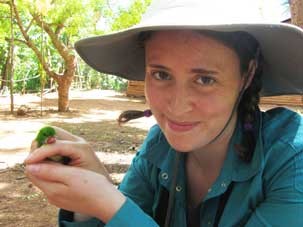Like every other PhD student I know, I dread family gatherings. Every time I walk into a room full of aunts, uncles, grandparents, cousins (and assorted random people that I’m ostensibly somehow related to), I find myself explaining over and over what I do – and more importantly, why I do it.
To tell you the truth, that ‘why’ is something that’s been bothering me more and more as I move closer to completing my degree. I’ve spent the better part of the last decade obsessively focused on understanding the migration patterns of western bluebirds in one region of British Columbia…without really asking myself if anyone except me cares.
Don’t get me wrong. I truly believe that there is inherent value in fundamental science. I recognize that not everything scientists do has to have an immediate application. I also recognize that most scientists will never be an Einstein or a Darwin – and that’s not necessarily a bad thing. Most of us are content to quietly explore our own corners of the universe, making small contributions to humanity’s understanding of the world whenever possible.
But it still bothers me that when my grandmother asks me why I study bird migration, I can’t really give her a good answer. And I’ve come to realize that the problem is me: somewhere inside, I still nurture a naive but apparently indestructible belief that I can make a difference in the world.
When I started my undergraduate in biology, science seemed to be a great way of doing just that. After all, no one would deny that Einstein and Darwin did science that changed the world. But as I approach the end of my PhD, I’ve had to come to terms with the fact that my science is just not world-changing stuff. It’s interesting – at least to me – and may even have some conservation implications, but it’s not the kind of science that will shift paradigms and reshape our understanding of the universe.
As a classic overachiever, I have found accepting that fact a challenge. When I signed up for Projected Futures, I mostly thought the course might be a good chance to step away from my frustration with science and clear my head. But I didn’t expect the course to be such an eye-opening experience.
When I sat down in class the first day, I believed a science journalist’s job was to translate scientific findings and advances, making them accessible to the wider world. And that is part of it, of course. But the more I learned, the more I realized that science journalism is a lot more than just translation. It involves evaluating evidence and thinking critically – not just about the science, but also about its social and ethical context and implications.
The course made it clear to me just how important science journalists are: they form an essential bridge between science and the wider world, reminding each side that the other is there. And when it is done well, science journalism can absolutely change the world. Ultimately, Projected Futures served as a reminder for me that there are many ways of making a difference that don’t involve lab coats or experiments.



